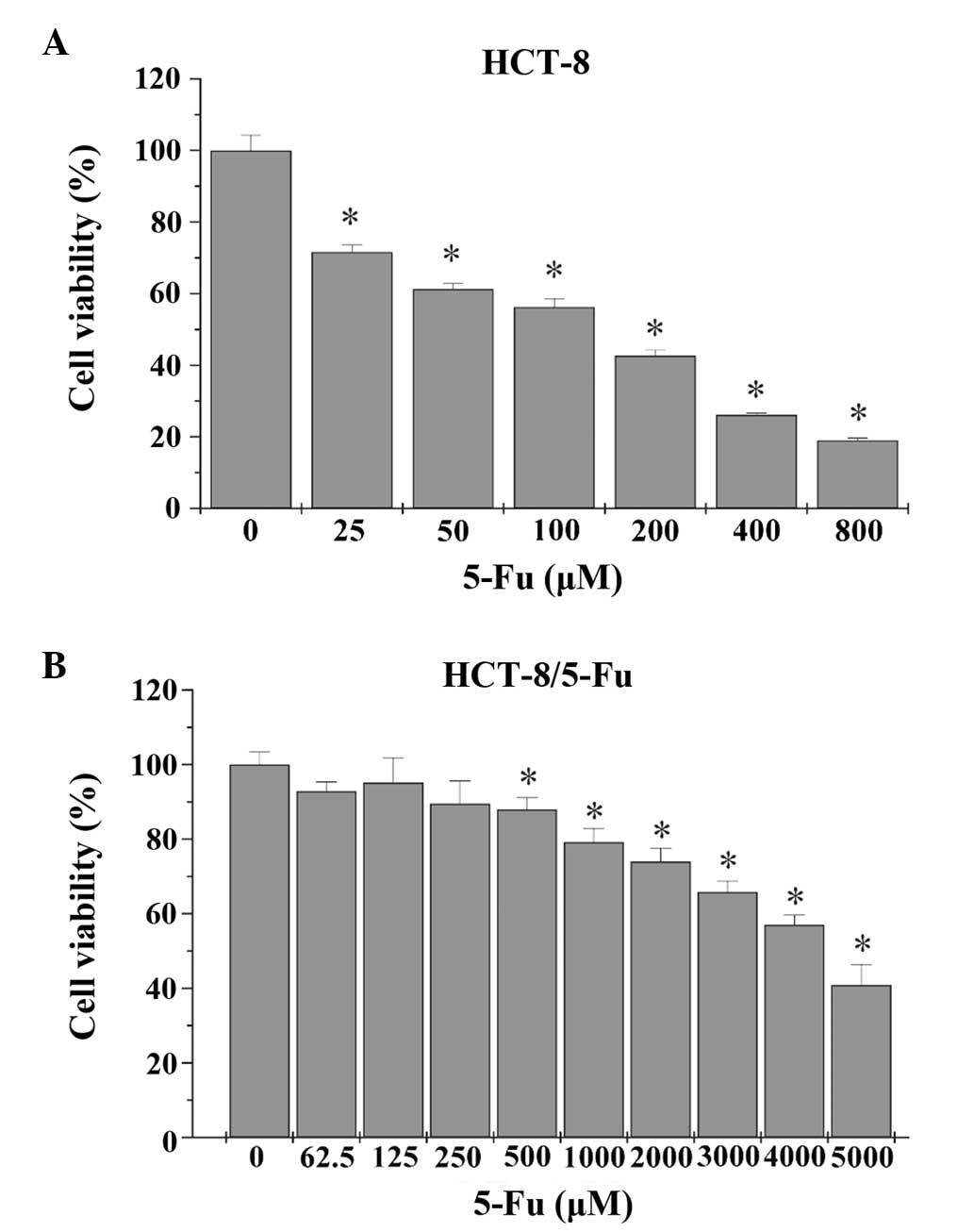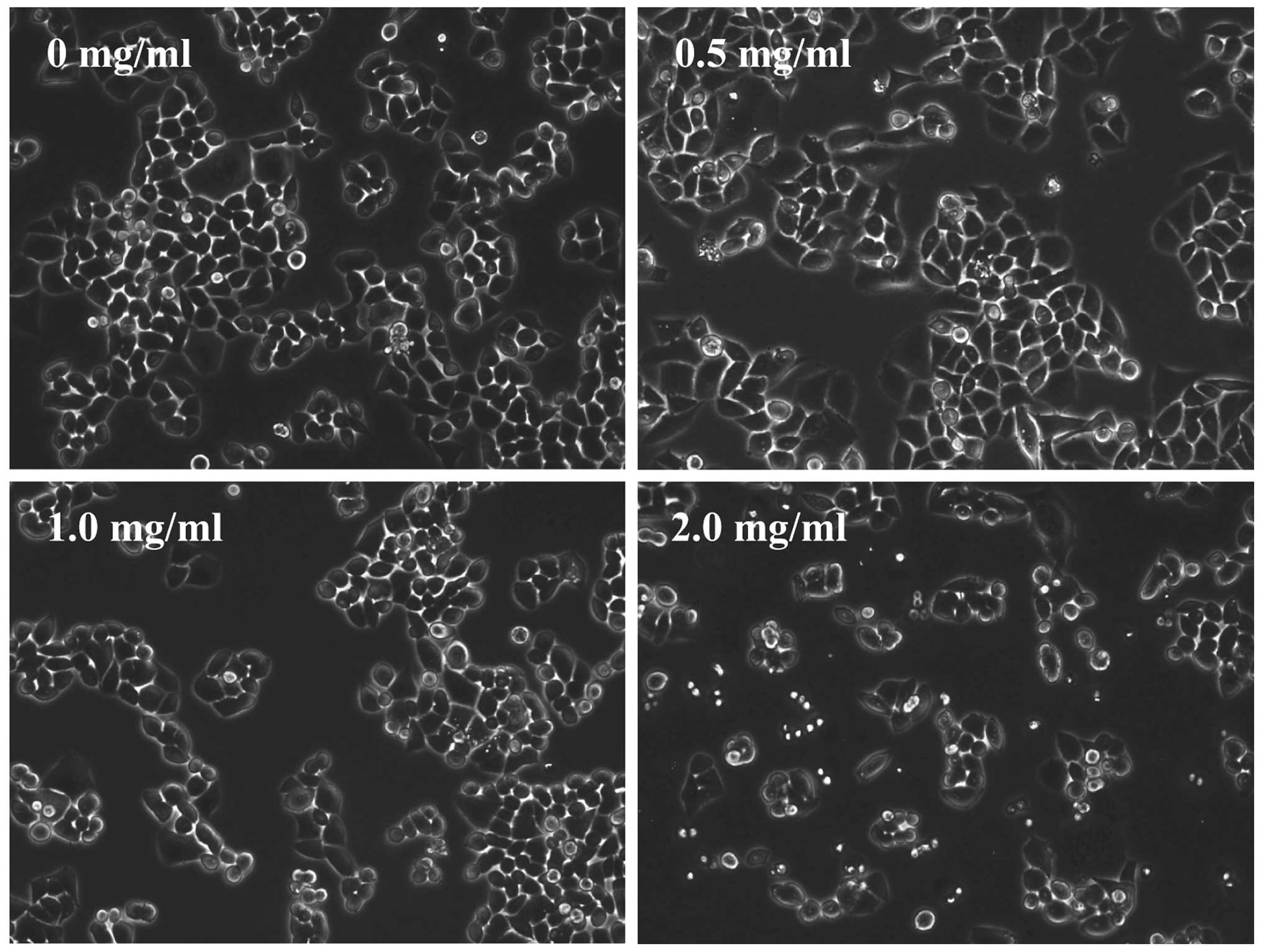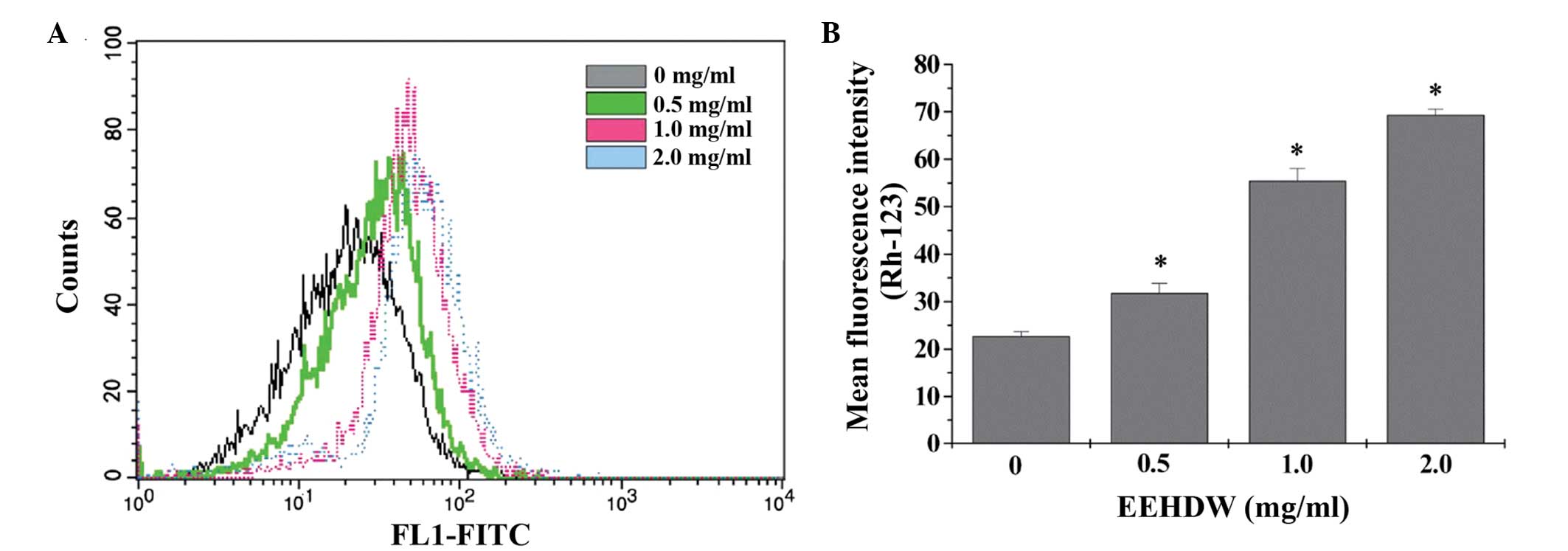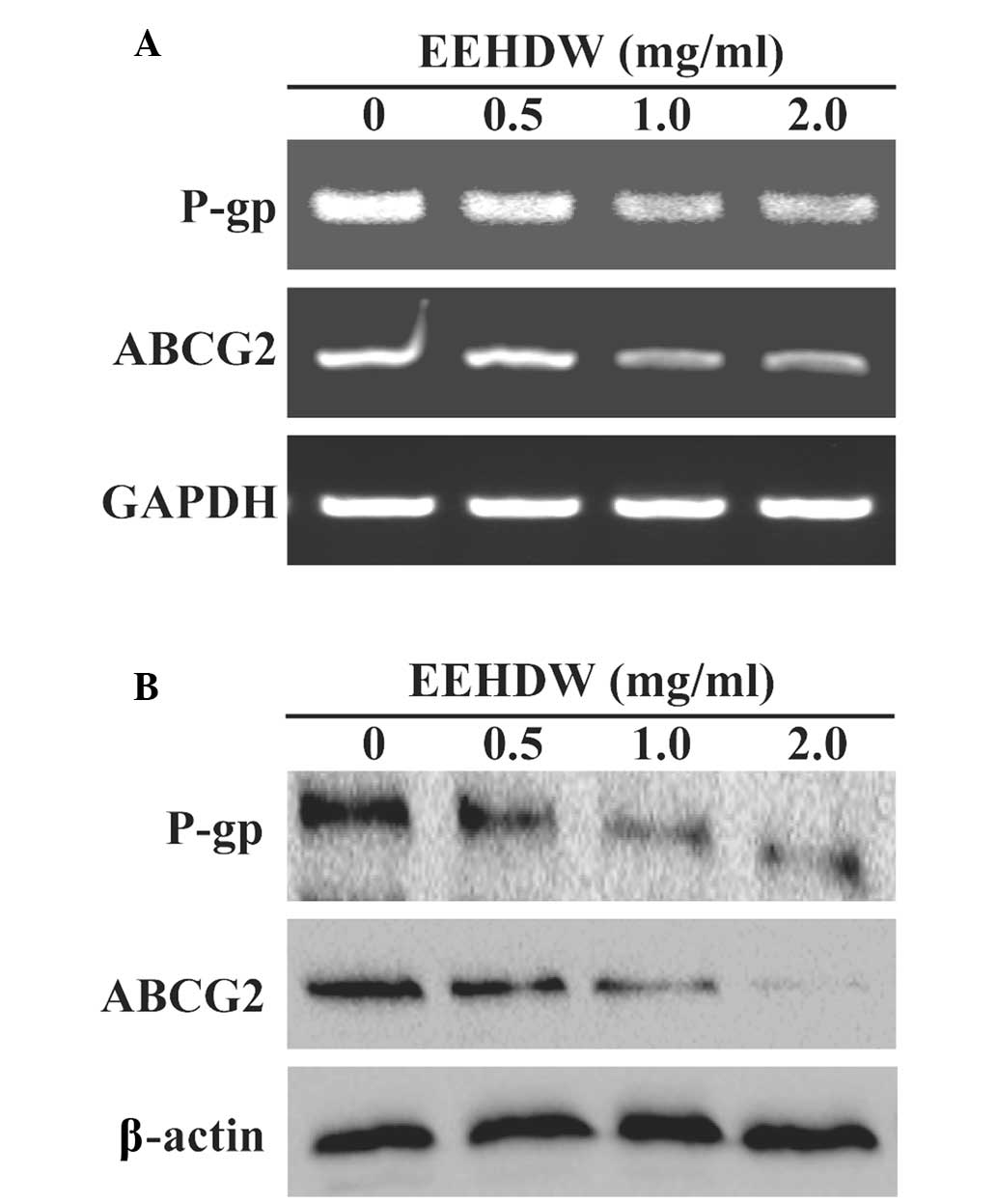|
1
|
Jemal A, Bray F, Center MM, Ferlay J, Ward
E and Forman D: Global cancer statistics. CA Cancer J Clin.
61:69–90. 2011. View Article : Google Scholar : PubMed/NCBI
|
|
2
|
Scurr M, Ladell K, Besneux M, et al:
Highly prevalent colorectal cancer-infiltrating LAP+
Foxp3− T cells exhibit more potent immunosuppressive
activity than Foxp3+ regulatory T cells. Mucosal
Immunol. 7:428–439. 2014. View Article : Google Scholar : PubMed/NCBI
|
|
3
|
Giampieri R, Scartozzi M, Loretelli C,
Piva F, Mandolesi A, Lezoche G, Del Prete M, Bittoni A, Faloppi L,
Bianconi M, Cecchini L, Guerrieri M, Bearzi I and Cascinu S: Cancer
stem cell gene profile as predictor of relapse in high risk stage
II and stage III, radically resected colon cancer patients. PLoS
One. 8:e728432013. View Article : Google Scholar : PubMed/NCBI
|
|
4
|
Deeley RG, Westlake C and Cole SP:
Transmembrane transport of endo- and xenobiotics by mammalian
ATP-binding cassette multidrug resistance proteins. Physiol Rev.
86:849–899. 2006. View Article : Google Scholar : PubMed/NCBI
|
|
5
|
Gottesman MM, Fojo T and Bates SE:
Multidrug resistance in cancer: role of ATP-dependent transporters.
Nat Rev Cancer. 2:48–58. 2008. View
Article : Google Scholar
|
|
6
|
Qiao D, Tang S, Aslam S, Ahmad M, To KK,
Wang F, Huang Z, Cai J and Fu L: UMMS-4 enhanced sensitivity of
chemotherapeutic agents to ABCB1-overexpressing cells via
inhibiting function of ABCB1 transporter. Am J Cancer Res.
4:148–160. 2014.PubMed/NCBI
|
|
7
|
Leslie EM, Deeley RG and Cole SP:
Multidrug resistance proteins: role of P-glycoprotein, MRP1, MRP2,
and BCRP (ABCG2) in tissue defense. Toxicol Appl Pharmacol.
204:216–237. 2005. View Article : Google Scholar : PubMed/NCBI
|
|
8
|
Andersen V, Vogel U, Godiksen S, Frenzel
FB, Sæbø M, Hamfjord J, Kure E and Vogel LK: Low ABCB1 gene
expression is an early event in colorectal carcinogenesis. PLoS
One. 8:e721192013. View Article : Google Scholar : PubMed/NCBI
|
|
9
|
Zhang H, Wang YJ, Zhang YK, Wang DS,
Kathawala RJ, Patel A, Talele TT, Chen ZS and Fu LW: AST1306, a
potent EGFR inhibitor, antagonizes ATP-binding cassette subfamily G
member 2-mediated multidrug resistance. Cancer Lett. 350:61–68.
2014. View Article : Google Scholar : PubMed/NCBI
|
|
10
|
Wang X and Morris ME: Effects of the
flavonoid chrysin on nitrofurantoin pharmacokinetics in rats:
potential involvement of ABCG2. Drug Metab Dispos. 35:268–274.
2007. View Article : Google Scholar : PubMed/NCBI
|
|
11
|
Robey RW, To KK, Polgar O, Dohse M, Fetsch
P, Dean M and Bates SE: ABCG2: A perspective. Adv Drug Deliv Rev.
61:3–13. 2009. View Article : Google Scholar : PubMed/NCBI
|
|
12
|
Li WY, Chan SW, Guo DJ, Chung MK, Leung TY
and Yu PH: Water extract of Rheum officinale Baill. induces
apoptosis in human lung adenocarcinoma A549 and human breast cancer
MCF-7 cell lines. J Ethnopharmacol. 124:251–256. 2009. View Article : Google Scholar : PubMed/NCBI
|
|
13
|
Rasul A, Yu B, Yang LF, Ali M, Khan M, Ma
T and Yang H: Induction of mitochondria-mediated apoptosis in human
gastric adenocarcinoma SGC-7901 cells by kuraridin and
Nor-kurarinone isolated from Sophora flavescens. Asian Pac J Cancer
Prev. 12:2499–2504. 2011.PubMed/NCBI
|
|
14
|
Li Q, Sui H, Liu X, Qin JM, Yin PH and Fan
ZZ: Effect of Jianpi Jiedu Recipe mediated JNK/SAPK signal
transduction pathway on regulating multidrug resistance in human
colon carcinoma cells. Zhonghua Zhong Yi Yao Za Zhi. 27:731–735.
2012.(In Chinese).
|
|
15
|
Sadava D, Ahn J, Zhan M, Pang ML, Ding J
and Kane SE: Effects of four Chinese herbal extracts on
drug-sensitive and multidrug-resistant small-cell lung carcinoma
cells. Cancer Chemother Pharmacol. 49:261–266. 2002. View Article : Google Scholar : PubMed/NCBI
|
|
16
|
Xu D, Lu Q and Hu X: Down-regulation of
P-glycoprotein expression in MDR breast cancer cell MCF-7/ADR by
honokiol. Cancer Lett. 243:274–280. 2006. View Article : Google Scholar : PubMed/NCBI
|
|
17
|
Wan CK, Zhu GY, Shen XL, Chattopadhyay A,
Dey S and Fong WF: Gomisin A alters substrate interaction and
reverses P-glycoprotein-mediated multidrug resistance in HepG2-DR
cells. Biochem Pharmacol. 72:824–837. 2006. View Article : Google Scholar : PubMed/NCBI
|
|
18
|
Liao B, Ge RY, Chen X, Huangfu ZP, Qi Y,
Song YP and Wei XD: Synergistic reversal effect of Chinese medicine
compound FFJZ combined with cyclosporine A on multidrug resistance
of leukemia K562/VCR cell line. Zhongguo Shi Yan Xue Ye Xue Za Zhi.
15:752–755. 2007.(In Chinese). PubMed/NCBI
|
|
19
|
Wang J, Xia Y, Wang H and Hou Z: Chinese
herbs of Shenghe Powder reverse multidrug resistance of gastric
carcinoma SGC-7901. Integr Cancer Ther. 6:400–404. 2007. View Article : Google Scholar : PubMed/NCBI
|
|
20
|
Hu YJ, Shen XL, Lu HL, Zhang YH, Huang XA,
Fu LC and Fong WF: Tenacigenin B derivatives reverse
P-glycoprotein-mediated multidrug resistance in HepG2/Dox cells. J
Nat Prod. 71:1049–1051. 2008. View Article : Google Scholar : PubMed/NCBI
|
|
21
|
Angelini A, Di Ilio C, Castellani ML,
Conti P and Cuccurullo F: Modulation of multidrug resistance
p-glycoprotein activity by flavonoids and honokiol in human
doxorubicin-resistant sarcoma cells (MES-SA/DX-5): implications for
natural sedatives as chemosensitizing agents in cancer therapy. J
Biol Regul Homeost Agents. 24:197–205. 2010.PubMed/NCBI
|
|
22
|
Sui H, Liu X, Jin BH, Pan SF, Zhou LH, Yu
NA, Wu J, Cai JF, Fan ZZ, Zhu HR and Li Q: Zuo Jin Wan, a
traditional Chinese herbal formula, reverses P-gp-mediated MDR in
vitro and in vivo. Evid Based Complement Alternat Med.
2013:9570782013.PubMed/NCBI
|
|
23
|
Lin J, Chen Y, Wei L, Chen X, Xu W, Hong
Z, Sferra TJ and Peng J: Hedyotis diffusa Willd extract induces
apoptosis via activation of the mitochondrion-dependent pathway in
human colon carcinoma cells. Int J Oncol. 37:1331–1338.
2010.PubMed/NCBI
|
|
24
|
Lin J, Wei L, Xu W, Hong Z, Liu X and Peng
J: Effect of Hedyotis diffusa Willd extract on tumor angiogenesis.
Mol Med Rep. 4:1283–1288. 2011.PubMed/NCBI
|
|
25
|
Cai Q, Lin J, Wei L, Zhang L, Wang L, Zhan
Y, Zeng J, Xu W, Shen A, Hong Z and Peng J: Hedyotis diffusa Willd
inhibits colorectal cancer growth in vivo via inhibition of STAT3
signaling pathway. Int J Mol Sci. 13:6117–6128. 2012. View Article : Google Scholar : PubMed/NCBI
|
|
26
|
Lin J, Wei L, Shen A, Cai Q, Xu W, Li H,
Zhan Y, Hong Z and Peng J: Hedyotis diffusa Willd extract
suppresses Sonic hedgehog signaling leading to the inhibition of
colorectal cancer angiogenesis. Int J Oncol. 42:651–656. 2013.
View Article : Google Scholar : PubMed/NCBI
|
|
27
|
Han Y, Bu LM, Ji X, Liu CY and Wang ZH:
Modulation of multidrug resistance by andrographolid in a
HCT-8/5-FU multidrug-resistant colorectal cancer cell line. Chin J
Dig Dis. 6:82–86. 2005. View Article : Google Scholar : PubMed/NCBI
|
|
28
|
Lee JS, Paull K, Alvarez M, Hose C, Monks
A, Grever M, Fojo AT and Bates SE: Rhodamine efflux patterns
predict P-glycoprotein substrates in the National Cancer Institute
drug screen. Mol Pharmacol. 46:627–638. 1994.PubMed/NCBI
|
|
29
|
Twentyman PR, Rhodes T and Rayner S: A
comparison of rhodamine 123 accumulation and efflux in cells with
P-glycoprotein-mediated and MRP-associated multidrug resistance
phenotypes. Eur J Cancer. 30A:1360–1369. 1994. View Article : Google Scholar : PubMed/NCBI
|
|
30
|
Van Cutsem E, Nordlinger B and Cervantes
A: ESMO Guidelines Working Group: Advanced colorectal cancer: ESMO
Clinical Practice Guidelines for treatment. Ann Oncol. 21(Suppl 5):
v93–v97. 2010. View Article : Google Scholar : PubMed/NCBI
|
|
31
|
Natarajan K, Xie Y, Baer MR and Ross DD:
Role of breast cancer resistance protein (BCRP/ABCG2) in cancer
drug resistance. Biochem Pharmacol. 83:1084–1103. 2012. View Article : Google Scholar : PubMed/NCBI
|
|
32
|
Nakanishi T and Ross DD: Breast cancer
resistance protein (BCRP/ABCG2): its role in multidrug resistance
and regulation of its gene expression. Chin J Cancer. 31:73–99.
2012. View Article : Google Scholar : PubMed/NCBI
|
|
33
|
Stacy AE, Jansson PJ and Richardson DR:
Molecular pharmacology of ABCG2 and its role in chemoresistance.
Mol Pharmacol. 84:655–669. 2013. View Article : Google Scholar : PubMed/NCBI
|
|
34
|
Yang HW, Hua MY, Liu HL, Tsai RY, Pang ST,
Hsu PH, Tang HJ, Yen TC and Chuang CK: An epirubicin-conjugated
nanocarrier with MRI function to overcome lethal
multidrug-resistant bladder cancer. Biomaterials. 33:3919–3930.
2012. View Article : Google Scholar : PubMed/NCBI
|
|
35
|
Liu KJ, He JH, Su XD, Sim HM, Xie JD, Chen
XG, Wang F, Liang YJ, Singh S, Sodani K, et al: Saracatinib
(AZD0530) is a potent modulator of ABCB1-mediated multidrug
resistance in vitro and in vivo. Int J Cancer. 132:224–235. 2013.
View Article : Google Scholar : PubMed/NCBI
|
|
36
|
Sane R, Mittapalli RK and Elmquist WF:
Development and evaluation of a novel microemulsion formulation of
elacridar to improve its bioavailability. J Pharm Sci.
102:1343–1354. 2013. View Article : Google Scholar : PubMed/NCBI
|
|
37
|
Kono T, Hata T, Morita S, Munemoto Y,
Matsui T, Kojima H, Takemoto H, Fukunaga M, Nagata N, Shimada M,
Sakamoto J and Mishima H: Goshajinkigan oxaliplatin neurotoxicity
evaluation (GONE): a phase 2, multicenter, randomized,
double-blind, placebo-controlled trial of goshajinkigan to prevent
oxaliplatin-induced neuropathy. Cancer Chemother Pharmacol.
72:1283–1290. 2013. View Article : Google Scholar : PubMed/NCBI
|
|
38
|
Pallis M and Russell N: A drug efflux
independant role for P-glycoprotein in augmenting the apoptosis
induced by growth factor withdrawal in acute myeloid leukemia. Br J
Haematol. 105:77–83. 1999.
|



















